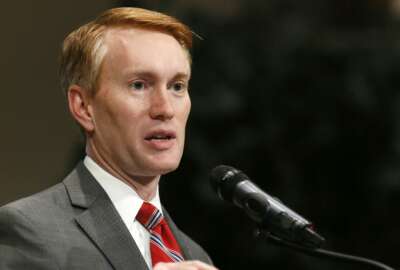
Senators push for max telework in next coronavirus relief package
Congressional leaders haven't agreed yet to the big-ticket items in the next coronavirus relief package, but members are already pushing for smaller provisions. A...
The most important, consequential bill floating around Capitol Hill is one that isn’t written yet.
Congressional leaders are still negotiating what big-ticket items they’ll include in a fourth coronavirus relief package, but many senators are already pushing for smaller provisions.
More than 20 Senate Democrats and Sen. Lisa Murkowski (R-Alaska) are urging Congress to require maximum telework for federal employees during the ongoing pandemic.
“All federal employees and contractors who can perform their duties remotely should be doing so,” senators wrote in July 31 letter to Majority Leader Mitch McConnell (R-Ky.) and Minority Leader Chuck Schumer (D-N.Y.). “Agencies should enable telework for as many federal workers and contractor personnel as possible, and should continue to maximize telework throughout the pandemic. Telework protects not only federal employees from the spread of COVID-19, but also their families and the communities across the country in which they work.”
Sen. Chris Van Hollen (D-Md.) led the latest letter. He and other signatories have been critical of the Trump administration’s past telework guidance.
Agencies have taken a wide variety of approaches to telework during the latter months of the pandemic. Some, such the Agriculture, Energy and State Departments, have brought some employees back under their phased reopening plans.
Others, including NASA and smaller agencies like the Merit Systems Protection Board, have kept mandatory or maximum telework in place for the vast majority of employees.
A Federal News Network survey found the vast majority of employees — some 85% of teleworkers and 52% of non-teleworkers — said they had some level of discomfort with returning to the office or having more of their coworkers join them at the work site.
Read more Congressional news
“Maximum telework makes it easier to maintain safe spacing among those who must report to the office and it allows employees to better manage their family situations that are disrupted by closed schools and child care facilities,” Tony Reardon, national president of the National Treasury Employees Union, said Friday in a statement. “There will come a time when we are ready to return to normal operations in the federal workplace. This is not it.”
It’s unclear when Congress and the Trump administration will agree to terms for a fourth coronavirus relief package, but lawmakers have recommended a wide variety of other provisions for the bill. House Majority Leader Steny Hoyer (D-Md.) suggested including $2 billion for the technology modernization fund, specifically for the IRS.
Beyond the coronavirus relief package, here are a few other bills worth watching.
Coronavirus task forces by and for feds
Sen. Brian Schatz (D-Hawaii) has new legislation that would create formal union-agency task forces, which would review existing policies on telework, leave, cleaning procedures and training policies.
Under the Federal Labor-Management COVID Partnership Act, federal employees would have an avenue to provide input and feedback on their agencies’ plans during the pandemic.
The task force would be made up of the Office of Personnel Management director, the deputy director for management at the Office of Management and Budget, the National Institute for Occupational Safety and Health director, deputy secretaries from two other agencies, the Federal Labor Relations Authority chairman and the director of the Federal Mediation and Conciliation Service.
The American Federation of Government Employees, National Treasury Employees Union and Federal Managers Association would also have members on the task force, which would meet virtually once a week. According to the legislation, the task force has the authority to hold hearings and collect data and information from agencies to inform their work.
The task force is supposed to review the government’s overall response to the pandemic, its outreach and communication to federal employees and its preparation and safety protocols, among other topics.
Read more Agency Oversight news
In addition, the task force is supposed to study and report on the “optimal telework policies” for each agency, including how many federal employees can telework and what it would take to ensure all workers deemed “telework ready” are, in fact, ready and capable for remote work.
The task force should also develop a series of action reports following the pandemic, which would describe how the federal government’s response to future health crises can and should improve.
The coronavirus labor-management task force is modeled after similar groups that the Clinton and Obama administration had formed to discuss general agency and union matters during their administrations.
FMA and several federal employee unions have endorsed the bill. It also has several co-sponsors, including Sens. Gary Peters (D-Mich.), Dianne Feinstein (D-Calif.), Sherrod Brown (D-Ohio) and Ben Cardin and Chris Van Hollen (D-Md.).
Reauthorization for the MSPB
New legislation from House Oversight and Reform Committee Chairman Carolyn Maloney (D-N.Y.) and Government Operations Subcommittee Chairman Gerry Connolly (D-Va.) would reauthorize the Merit Systems Protection Board for five more years.
The board has been without a single board member since last March, when the carryover term for the lone remaining member expired. The board has lacked a quorum for nearly three-and-a-half years.
The backlog of pending petitions for review stood at roughly 2,900 as of June.
“We have a crisis at the Merit Systems Protection Board,” Connolly said. “For more than a year we have had a vacant board with little recourse for federal employees seeking adjudication of their cases. The MSPB protects whistleblowers from retaliation, veterans from job discrimination and federal employees from prohibited personnel practices. Congress must ensure that it can immediately restart operations.”
Beyond simply reauthorizing MSPB, the bill expands the agency’s research and study authority, allowing the board to conduct more actionable surveys. It also mandates whistleblower engagement training for MSPB administrative judges and other employees. The legislation, however, does nothing to resolve MSPB’s lack of quorum.
The administration’s three nominees to fill the board and restore a quorum have been pending before the Senate for more than a year.
Copyright © 2025 Federal News Network. All rights reserved. This website is not intended for users located within the European Economic Area.
Nicole Ogrysko is a reporter for Federal News Network focusing on the federal workforce and federal pay and benefits.
Follow @nogryskoWFED
Related Stories

Senate forces ‘first’ for MSPB as the agency loses all members




